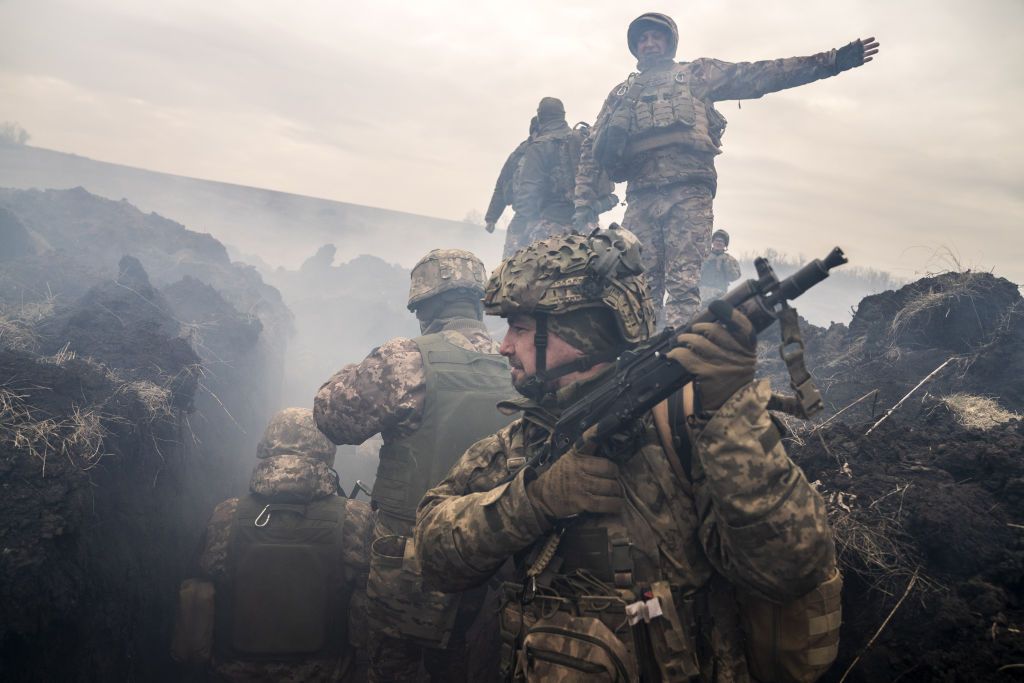Opinion: Defeatists will be on the wrong side of history

Graffiti presumably by England-based street artist Banksy on a destroyed wall in Borodianka, Ukraine, on Nov. 12, 2022. (Celestino Arce/NurPhoto via Getty Images)

Yuriy Gorodnichenko
Over two years into Russia’s full-scale invasion of Ukraine, the mood among Ukraine’s supporters is dropping.
There are several reasons for this, including Ukraine’s unsuccessful counteroffensive last year, the replacement of the popular Valerii Zaluzhnyi as commander-in-chief of Ukraine’s Armed Forces, tension among Ukraine’s leadership, mobilization difficulties, delays in weapons and ammunition deliveries by Ukraine’s Western allies, and the stalled $60 billion aid package in Washington.
All of this is creating a mood of toxic defeatism.
Those who oppose aid to Ukraine think the Russian military’s numerical superiority makes Ukraine’s defeat inevitable, even with Western help. They argue that Ukraine should negotiate a peace agreement with Russia as fast as possible, i.e., surrender and accept defeat.
This has happened before. When Nazi Germany invaded France, Marshal Pétain, known for his successful defense in World War I’s Battle of Verdun, thought the inferiority of the French army made any resistance futile. He thus collaborated with the Nazi regime to “cut his losses” in the face of inevitable defeat. The same argument can now be used to justify why Ukraine should surrender before it’s too late.
Pétain’s decision was disastrously wrong. The Blitz, Dunkirk, the lost Norwegian campaign, imminent invasion, and other factors weighed heavily on the United Kingdom. Joe Kennedy, the then U.S. ambassador to the U.K., publicly suggested: “Democracy is finished in England,” amplifying the chorus of isolationist and lets-negotiate-with-Hitler Americans.
And yet, U.K. Prime Minister Winston Churchill vowed, “We shall fight on the beaches, we shall fight on the landing grounds, we shall fight in the fields and in the streets, we shall fight in the hills; we shall never surrender. We shall never surrender.” This determination helped to win World War II.
As was the case in World War II, defeatism regarding Ukraine will be on the wrong side of history.
Just like Churchill, Ukraine’s leadership vowed to fight Russia to the end and Ukrainians overwhelmingly share this determination. Ukrainians also care much more about the war than Russians. They know that the war is a question of survival. This motivation, much more than Western military assistance, is behind Ukraine’s success so far in containing Russia’s invasion.
There are many cases in history of a militarily stronger invader being defeated by a smaller country. The city-state of Athens famously defeated the invading Persian army in the Battle of Marathon in 490 BCE. Closer in time, the U.S. lost the Vietnam War, and the Vietnamese later repelled a Chinese invasion in 1979. The Soviet Army was defeated in Afghanistan. The Russian Army will meet a similar fate – if not worse – in Ukraine. There is no stronger driver than fighting for one’s freedom against an enemy trying to enslave you.

Without further military and financial support from the U.S. and Europe, it will be very difficult for Ukraine to chase the Russian military from the territories it has occupied since 2014. This does not mean, however, that Russia would then be able to conquer Ukraine – far from it. If Western aid to Ukraine were to remain insufficient or even significantly reduced, Kyiv would adjust its strategy.
The Ukrainian Army has been able to show not only its resilience but also its extraordinary capacity to innovate and adapt fast to the circumstances of war. The war would certainly last longer and claim more innocent victims, but the Ukrainian military would still be able to defeat Russian forces through “death by a thousand cuts.”
One cannot overestimate the importance of the willingness to fight.
The collapse of South Vietnam in 1975 and the Soviet authorities in Afghanistan in 1989 show that one cannot win without strong will. However, will is not enough. It must be supported by internal unity (homework for Ukraine’s leadership and society) and by resources from Ukraine’s allies (homework for Washington, London, Brussels, and other Western powers).
One can be confident that the mortal danger emanating from Russia’s full-scale invasion will keep Ukrainians together. Perhaps shockingly, despite its overwhelming economic and military superiority, the West has turned out to be the weak link in this war. This is a shame. The West must double down on its military and economic aid to Ukraine.
The least Western supporters can do for Ukrainians is help fight unfounded defeatism within their own ranks. After all, confidence in Ukraine’s victory is a precondition to convince voters to help Ukraine decisively defeat the Russian imperialists as soon as possible.
To conclude, the fundamentals of this war are clear. Ukraine has more will to win than Russia, and the West has vast resources and diverse tools to support this will. And to defeatists, we can only quote Churchill: “There is only one answer to defeat, and that is victory.”
Editor’s Note: The opinions expressed in the op-ed section are those of the authors and do not purport to reflect the views of the Kyiv Independent.













